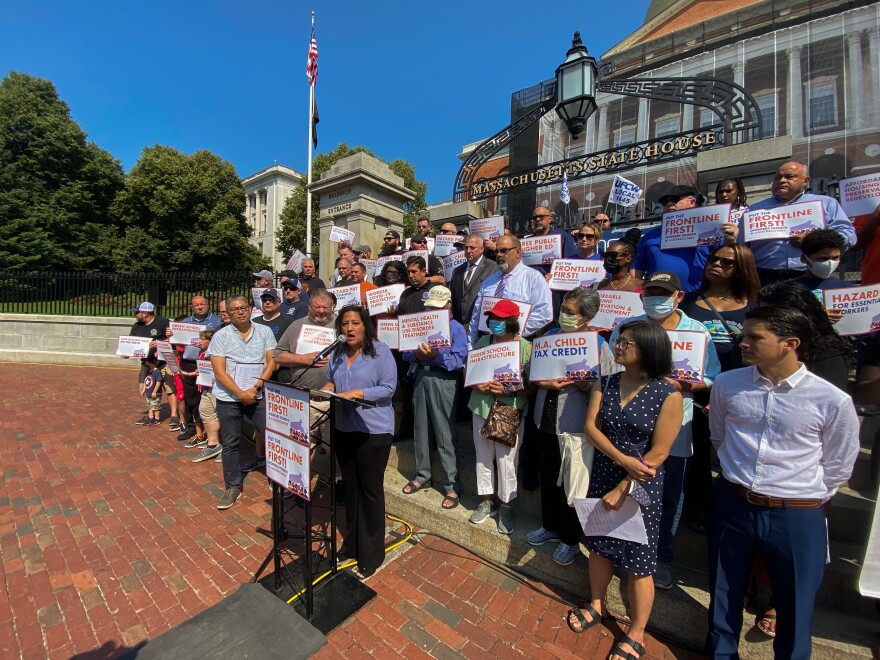Retroactive hazard pay for essential workers and investments to make college and housing more affordable for low-income residents were among the demands outlined Tuesday during a rally outside the Massachusetts Statehouse on ways to invest nearly $5 billion in available federal COVID-19 relief funds.
With lawmakers taking a go-slow approach to investing American Rescue Plan Act funds, a coalition of labor and community groups laid out their proposals. Darlene Lombos, executive secretary-treasurer of the Greater Boston Labor Council, said the funds will determine the pace of progress "at a critical juncture in our recovery."
One of the largest spending requests is $1 billion for housing preservation and redevelopment to assist at-risk and low-income residents.
Andres Castillo, executive director of Right to the City Boston, said a housing crisis existed in Boston long before the pandemic started.
"We have [a federal] administration that is listening to the problem, and is handing us the resources to craft our own solution," he said. "The question is will we take advantage of it. So we need the administration, we need the Legislature to put resources into affordable housing, into preserving people's tenancies, and people's homeownership opportunities."
Others calls for investments in frontline workers, communities of color, and low-income communities.
The coalition, Community Labor United, is calling for just over $997 million to be spent on hazard pay for essential workers, including $400 million to create a health care provider grant and premium pay program that would allow for one-time bonuses of $1,000 to $3,000 for the health care workforce.
Another $65 million should be spent on providing public transit workers an extra $3 per hour hazard pay for time worked between March 2020 to August 2021, the group says.
Jim Evers, president of the Boston Carmen's Union ATU 589, said transit workers showed up every day to work despite the health risks associated with contracting the virus.
"Transit workers especially were exposed to hundreds of passengers daily, while face coverings were not enforced," Evers said. " ... We showed up to work in the worst of the surge. We had a duty and a responsibility to the commonwealth, now the commonwealth has a duty and a responsibility to its workers."
Rep. Maria Robinson filed a bill last year to provide hazard pay for employees of essential services who worked outside their home during the COVID-19 state of emergency. Sen. Paul Feeney filed similar legislation (S 1196) this session that is being considered by the Labor and Workforce Development Committee.
Salem State University Psychology Professor Joanna Gonsalves said the American Rescue Plan offer a one-time chance "to fix what is broken in the commonwealth and to lay some plans for long term solutions."
She pointed to a coalition request that lawmakers set aside $650 million to pay for two years of tuition and fees for all low-income students in community colleges, state universities, and the University of MAssachusetts.
"It's important also that we think about how students' debt is accumulating," Gonsalves said. "And once they leave, if they're lucky enough to have a degree, that's going to have a lifetime impact not only right in their first job opportunities, but also their ability to buy a home, right, and it's exacerbating disparities that already exist for our Black and Brown students."
The coalition asked lawmakers to allocate $700 million for a fully refundable state match to the federal Child Tax Credit with a recommended allocation of $600 per child ages 0-12 for families who earn less than $200,000 per year with a single filer or $400,000 as joint filers.
The American Rescue Plan Act expanded the child tax credit providing $3,000 per child up to age 17 and $3,600 per child under age 6. Karen Chen, executive director of the Chinese Progressive Association, said that "families with kids know well that our child care system was broken long before COVID."
"When the women in our community stepped up as de facto unpaid caregivers, what things did they get? They were pushed out of the workforce, years' gains in women's employment were erased," Chen said. "The fight for universal child care is under way but the victory is still distant. While we're fighting for public investment in child care as a public good, we know the families need help right now."
The rally coincided with the continuation of legislative hearings, which are expected to run into the fall, on ways to allocated the ARPA funds. Gov. Charlie Baker has laid out a $2.9 billion plan to invest some funds now while the Legislature is opting to wait before making major spending decisions.






